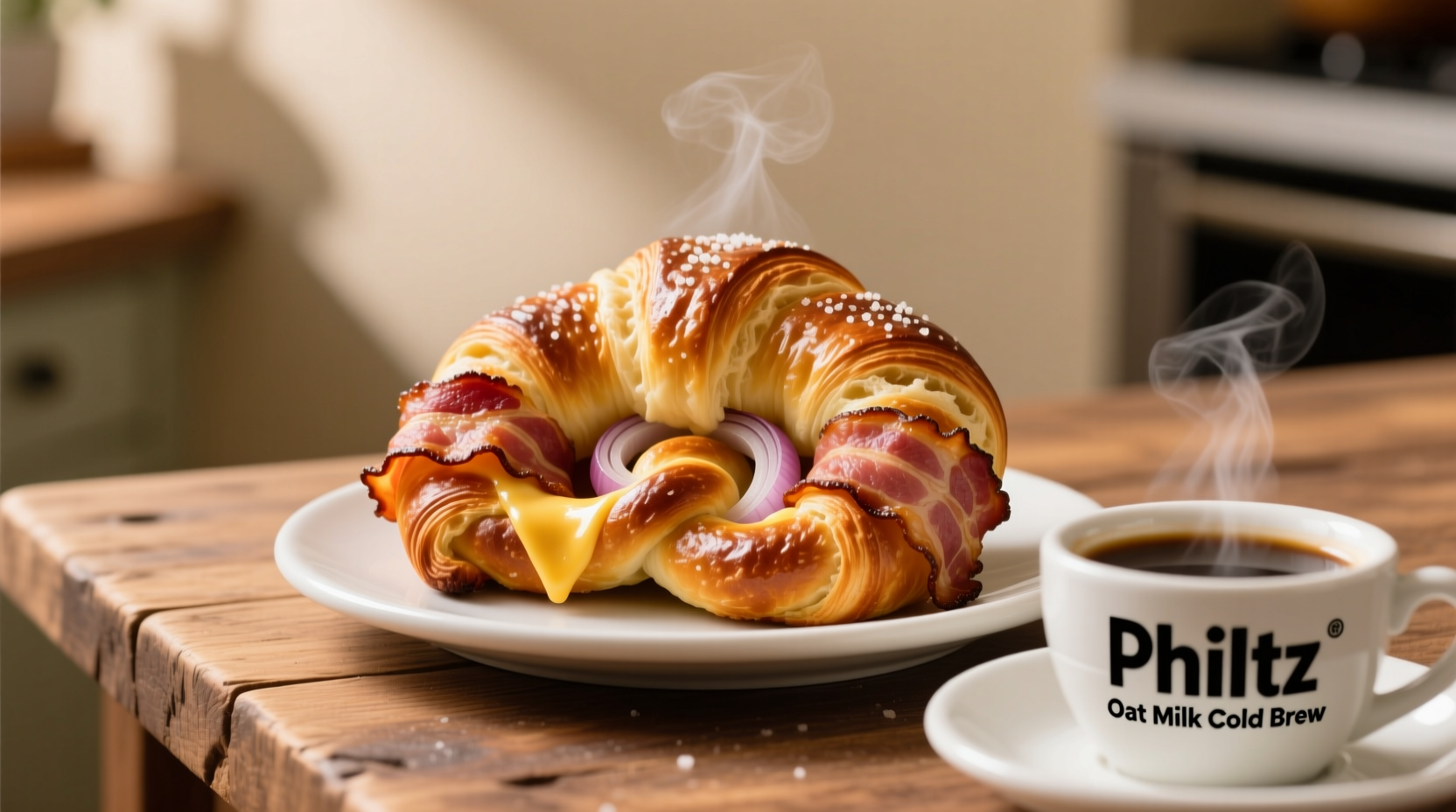Have you ever stood in line at Philz Coffee, eyeing that tempting bacon onion pretzel croissant, and wondered exactly what you're about to consume? You're not alone. As a pastry that perfectly blends savory and sweet elements, this menu item has become a favorite among coffee shop regulars—but understanding its nutritional profile is essential for making informed dietary choices.
What Exactly Is the Bacon Onion Pretzel Croissant?
Before diving into the numbers, let's clarify what this specialty item actually is. Despite the misspelling in many searches (croisannt), Philz Coffee serves a genuine pretzel croissant—a hybrid pastry that combines the flaky layers of a traditional croissant with the distinctive chewy texture and salted surface of a pretzel. The bacon onion version features crispy bacon bits and caramelized onions folded throughout the dough, creating a savory delight that pairs perfectly with their signature coffee blends.
Nutritional Profile Breakdown
Understanding the complete nutritional picture helps you make informed decisions about incorporating this treat into your diet. Here's the detailed breakdown per standard serving:
| Nutrient | Amount | % Daily Value* |
|---|---|---|
| Calories | 420 | 21% |
| Total Fat | 22g | 28% |
| Saturated Fat | 9g | 45% |
| Trans Fat | 0.5g | - |
| Cholesterol | 35mg | 12% |
| Sodium | 680mg | 30% |
| Total Carbohydrates | 48g | 17% |
| Dietary Fiber | 2g | 7% |
| Sugars | 18g | - |
| Protein | 5g | 10% |
*Percent Daily Values are based on a 2,000 calorie diet. Your daily values may be higher or lower depending on your calorie needs.
Contextualizing the Numbers
While 420 calories might seem substantial for a single pastry, it's important to understand where this fits within your overall dietary pattern. According to the Dietary Guidelines for Americans 2020-2025, a typical adult following a 2,000-calorie diet should aim for:
- Less than 10% of calories from saturated fat (about 22g)
- Less than 2,300mg of sodium per day
- At least 25g of fiber daily
This single pastry provides nearly half your recommended daily saturated fat limit and about 30% of your sodium allowance—important considerations if you're monitoring these nutrients for heart health.
How It Compares to Similar Pastries
When evaluating whether this Philz specialty fits your nutritional goals, comparison to similar items provides valuable context:
| Pastry Type | Calories | Saturated Fat | Sodium |
|---|---|---|---|
| Philz Bacon Onion Pretzel Croissant | 420 | 9g | 680mg |
| Plain Croissant (standard) | 231 | 7g | 200mg |
| Pretzel Roll (plain) | 280 | 1g | 500mg |
| Bacon, Egg & Cheese Croissant | 450 | 15g | 900mg |
Data sourced from the USDA FoodData Central database shows that the Philz specialty sits between a standard croissant and a full breakfast sandwich in terms of nutritional density. The addition of bacon and pretzel elements significantly increases both the calorie count and sodium content compared to a traditional croissant.
Practical Dietary Considerations
Enjoying this pastry while maintaining your health goals requires strategic planning. Here's how to approach it:
For Weight Management
At 420 calories, this pastry represents about 20-25% of a typical weight loss diet (1,600-1,800 calories daily). Consider these approaches:
- Share with a friend to cut calories in half
- Pair with black coffee rather than sugary beverages
- Balance with lighter meals later in the day
For Heart Health
The relatively high saturated fat and sodium content warrants attention if you're monitoring cardiovascular health. The American Heart Association recommends limiting saturated fat to less than 6% of daily calories (about 13g for a 2,000-calorie diet) and sodium to 1,500mg.
For Active Individuals
If you're physically active, this pastry can serve as a legitimate pre- or post-workout fuel source. The combination of carbohydrates and protein provides energy while the fats help with satiety. Just time your consumption appropriately around your activity.
When This Pastry Makes Sense in Your Diet
Every food has its place, and understanding context is key. This bacon onion pretzel croissant might be appropriate when:
- You're following a higher-calorie diet for athletic performance
- As an occasional treat within an otherwise balanced eating pattern
- When you've accounted for the sodium content in your other meals that day
- As part of a social experience where the enjoyment factor outweighs strict dietary adherence
Remember that dietary decisions aren't just about numbers—they're about your overall relationship with food and how it fits into your lifestyle.

Final Thoughts on Mindful Indulgence
Nutritional awareness doesn't have to eliminate enjoyment—it simply empowers you to make informed choices. The bacon onion pretzel croissant from Philz Coffee offers a delicious experience that can fit within various dietary patterns when consumed intentionally. By understanding the calorie content and nutritional profile, you can decide whether and how to include this specialty item in your eating routine without guilt or surprise.
Frequently Asked Questions
How many calories are in the Philz Coffee bacon onion pretzel croissant?
The bacon onion pretzel croissant from Philz Coffee contains approximately 420 calories per serving. This includes 22g of total fat (9g saturated), 48g of carbohydrates, 5g of protein, and 18g of sugar.
Is the bacon onion pretzel croissant considered high in sodium?
Yes, with approximately 680mg of sodium per serving, the bacon onion pretzel croissant contains about 30% of the recommended daily sodium limit (2,300mg). This is considered moderately high, especially if you're monitoring sodium intake for health reasons.
How does this pastry compare to a regular croissant nutritionally?
The bacon onion pretzel croissant (420 calories) contains significantly more calories than a standard plain croissant (approximately 231 calories). It also has higher sodium content (680mg vs 200mg) and more saturated fat (9g vs 7g), primarily due to the added bacon and pretzel elements.
Can I include this pastry in a weight loss diet?
Yes, with planning. At 420 calories, it represents about 20-25% of a typical weight loss diet (1,600-1,800 calories daily). Consider sharing it, pairing with black coffee, and balancing with lighter meals later in the day. Occasional indulgence can be part of a sustainable weight loss approach when accounted for in your overall calorie budget.
Does Philz Coffee provide official nutritional information for their pastries?
Philz Coffee makes nutritional information available in-store and through their customer service channels, though it may not be prominently displayed online. Nutritional values can vary slightly based on preparation methods and ingredient batches, so for the most accurate information, it's best to request current nutrition facts directly from Philz Coffee.











 浙公网安备
33010002000092号
浙公网安备
33010002000092号 浙B2-20120091-4
浙B2-20120091-4